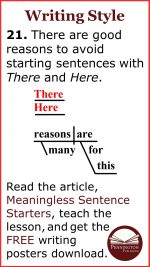Meaningless Sentence Starters
“Why do we have to avoid using too many There and Here words at the beginning of sentences?” Peja asked.
“There are reasons for that. Here they are,” Chiang said.
“I’m waiting. What’s the problem with using those sentence starters?”
“Avoid using meaningless words as sentence starters.”
“You didn’t answer my question.”
“I did. I told you why and showed you how.”
Definition and Examples
Using There or Here + a “helping verb” (has been, had been, will be, shall be, should be, would be, can be, could be, may be, might be, must be) or a “linking verb” (is, are, was, were) is rarely necessary and provides no additional meaning to a sentence. Example: There are the three students waiting over there. This sentence can be changed to… The three students wait over there. Example: Here is the blue pen to use to write your grandmother. This sentence can be changed to… Use the blue pen to write your grandmother.
Read the rule.
Avoid beginning sentences with There or Here + a “helping verb” or a “linking verb.” Revise to eliminate these words. To delete the unnecessary There or Here word, place the subject of the sentence at the beginning with or without its article (a, an, or the) and change the verb form as needed.
Re-write these sentences and [bracket] the meaningless words used as sentence starters.
- Here are plenty of samples to try.
- There is evidence to suggest that the owner knew that the painting was worthless.
- There were reasons for his actions, but we were never told what they were.
- Here is the envelope you were looking for in my desk.
- There will be consequences to your failures to act on his advice.
Eliminate the meaningless sentence starter in this sentence.
There are good reasons to avoid starting sentences with There and Here.
Answers
- [Here are] plenty of samples to try.
- [There is] evidence to suggest that the owner knew that the painting was worthless.
- [There were] reasons for his actions, but we were never told what they were.
- [Here is] the envelope you were looking for in my desk.
- [There will be] consequences to your failures to act on his advice.
*****
For more essay rules and practice, check out the author’s TEACHING ESSAYS BUNDLE. This curriculum includes 42 essay strategy worksheets corresponding to teach the Common Core State Writing Standards, 8 on-demand writing fluencies, 8 writing process essays (4 argumentative and 4 informative/explanatory), 64 sentence revision and 64 rhetorical stance “openers,” writing posters, and helpful editing resources. Differentiate your essay instruction in this comprehensive writing curriculum with remedial writing worksheets, including sentence structure, grammar, thesis statements, errors in reasoning, and transitions.Plus, get an e-comment bank of 438 prescriptive writing responses with an link to insert into Microsoft Word® for easy e-grading (works great with Google Docs),
Download the following 24 FREE Writing Style Posters to help your students learn the essay rules. Each has a funny or ironic statement (akin to “Let’s eat Grandma) to teach the memorable rule.
Get the Writing Style Posters FREE Resource:
Grammar/Mechanics, Spelling/Vocabulary, Study Skills, Writing





